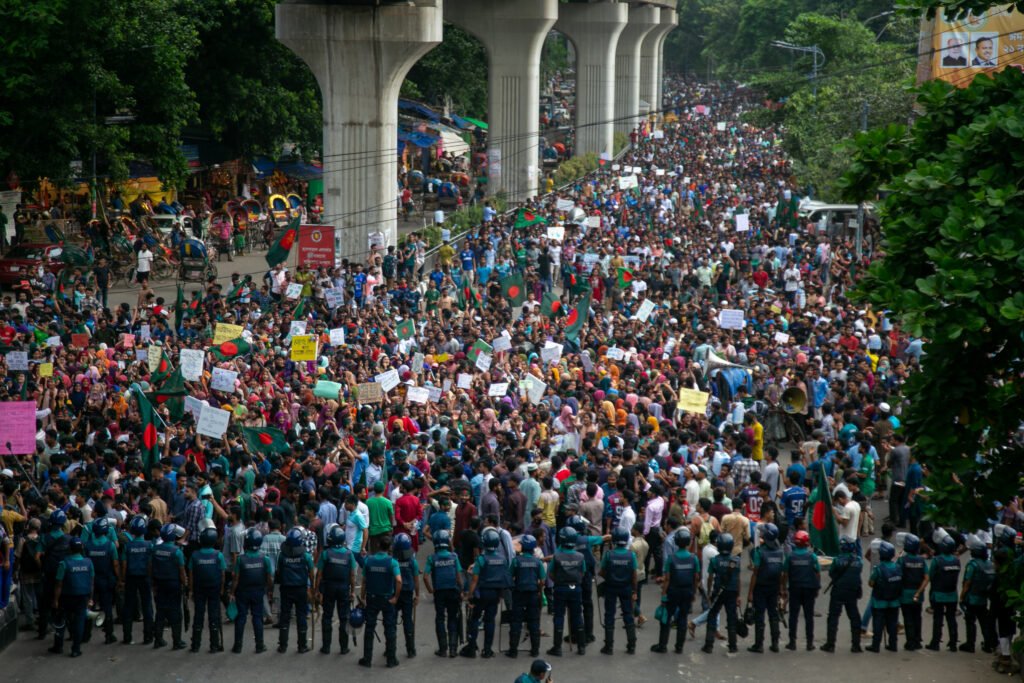Bangladesh Quota System Movement Lead to Six Deadly Deaths
Table of Contents
The Bangladesh quota system movement has a huge uprising, which has taken a tragic turn with six deaths. The idea of this movement came from the students all over the country, who stepped out of their classes to raise their voices against the quota system, which they think is discriminatory and unjust by the government. This paper analyzes the roots, situations, and consequences of this massive movement.

Source: Rayhan9d – নিজের কাজ
Historical Background of the Quota System
Bangladesh had set up its quota system to make reservations for certain groups that had remained out of the mainstream for long and thus were historically discriminate against. The groups include children of heroes of the war, women, ethnic minorities, and the disabled. A lion’s share, almost one-third, is reserved for the children of war heroes. The purpose is to assuage the hurt feelings of the family members of the martyrs who laid down their lives during the struggle for independence of the country.
Reason behind movements
Students, therefore, argue that the quota system is something archaic and, as such, a form of discrimination; it gives preferential treatment to one group of people over another, not considering merit. They demand a fair recruitment process based on qualifications and abilities, rather than reservation quotas, for public sector jobs. This movement has been driven by equal opportunities in public sector jobs.
Chronology of Key Events in the Movement
Initially, it was peaceful protesting but then it turned violent in response to the ignorant attitude of the government. The movement completely turned bloody as the Bangladesh Chhatra League, the student wing of the dominant Awami League party, counteracted the protesters from the student body, who were fighting for quota reform. The two fold clashes caused wide scale violence and the government was forced to suspend the quota system temporarily.
Impact on Education Institutions
The protests resulted in the closure of many schools and universities, resulting in a detriment to academic calendars. Students occupied campuses and protested through the streets, which made the running of these institutions absolutely impossible.
The Government’s Stand and Measures Undertaken
In this increasing wave of violence, the government responded by suspending the existing quota system. But this move was not enough for the agitators, who wanted to see a complete withdrawal of the quotas. Government officials blamed the opposition groups for provoking such violent activities and unrest.
Role of Political Groups
The Bangladesh Chhatra League was the student wing of the ruling Awami League and was at the forefront of clashes. However, the government blamed the student wings of opposition political parties—the Bangladesh Nationalist Party and Jamaat-e-Islami—for using the situation to their political advantage.
Violence and Clashes
These clashes with quota supporters caused many injuries and, tragically, the deaths of six individuals. These violent encounters indicated how deep the divisions were within the student community and wider society.
International Reaction
UN Secretary General Antonio Guterres urged the government of Bangladesh to ensure protection of its demonstrators and guarantee their safety. The movement and subsequent violence got massive coverage in the international media as a result that had the government take moves more seriously.
At Present
The agitation continues unabated as the students threaten to continue the movement until some permanent changes are affected despite the government’s suspension of the quota system. Major roads and highways in Dhaka and a few other cities remain blocked; wholesale disruption continues. These additional measures bring order back, enforced by the government.
Public Opinion
This has brought division among members of the public in Bangladesh. To some, the demand by students for a merit-based system is justifiable, while to others, the exercise of quotas is an assurance that the opportunities enjoyed by other societal members are preserved and not left with chances. Even influential people and opinion makers have added gasoline to the already inflamed debate.
What the Future Holds for the Quota System
The quota system of Bangladesh is at a juncture where reforms are being spoken of, but nothing has been made clear until now. Experts say the government will have to strike a balance between merit-based recruitment and affirmative action to please both sides.
Impact on Bangladesh’s Image
The movement and how the government has tackled it have both marred the image of Bangladesh at home and abroad. Perception about political stability and civil rights become a question in this nation. In the long term, foreign agencies may cease monitoring and pressuring the country.
Lessons Learnt
The Bangladesh quota system movement represents both the redressal value of dialogue and reform and stands as a warning note for potential violence from justified frustrations. The case of Bangladesh would be an example to abound for the nations, which have similar systems, by seeking out more inclusive solutions ahead of time.
The Bangladesh Quota System Movement is one of the most significant moments in the history of the country, representing deep-seated issues regarding fairness and equality. The way ahead is uncertain, though this movement has, to be sure, proved to be a much-needed moment of debate on the formation of a society more prone to justice. It is bound to define the future not only of public sector recruitment but also larger social policy in Bangladesh.
Source of Images: Wikipedia the free encyclopedia
